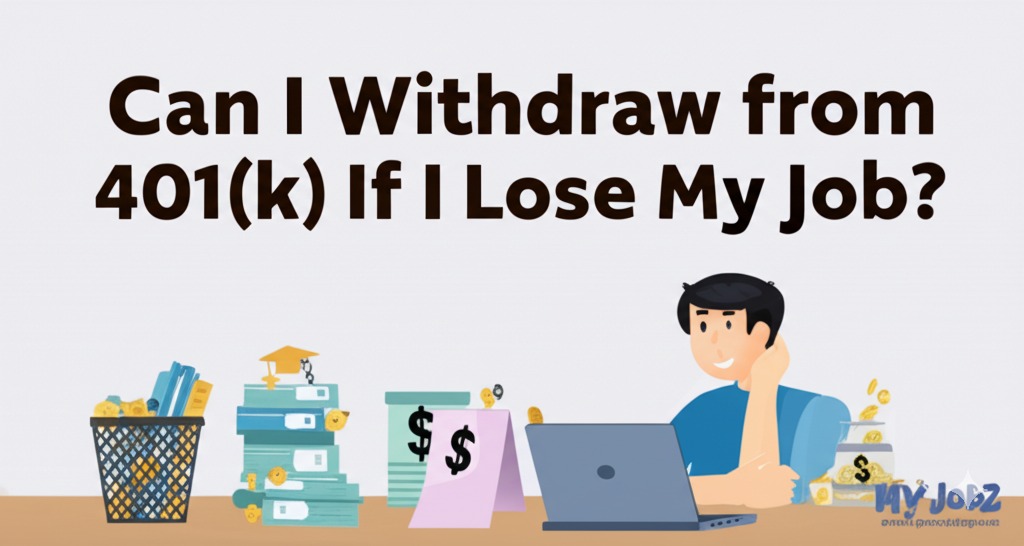
Losing your job can be one of the most stressful events in life. Not only do you have to deal with the emotional and financial challenges of unemployment, but you may also wonder about your retirement savings. One of the most common questions people have during this time is whether they can withdraw money from their 401(k) if they lose their job. The short answer is yes, but there are important factors to consider before making a decision. This article will explore your options for accessing your 401(k) after a job loss, including the pros and cons, and what you need to know to make an informed choice.
What Happens to Your 401(k) When You Lose Your Job?
When you leave a job, your 401(k) plan typically stays with the company that offered it unless you choose to move the funds. Losing your job doesn’t automatically trigger penalties or taxes, but it can change the way you access your retirement savings.
If you decide to withdraw from your 401(k) after losing your job, you must understand the implications. The IRS has rules about when and how you can access these funds, and withdrawing early comes with certain restrictions.
Options for Accessing Your 401(k) After Losing Your Job
There are several ways you can handle your 401(k) after job loss, each with different consequences.
1. Cashing Out Your 401(k)
One option is to cash out your 401(k) entirely. While this may seem tempting if you’re facing immediate financial needs, it’s not always the best choice.
Key Considerations:
- Penalties and Taxes: If you’re under 59½, cashing out your 401(k) will usually trigger a 10% early withdrawal penalty, in addition to the income tax you’ll owe on the amount you withdraw. This means you could lose a significant portion of your savings to taxes and penalties.
- Reduced Retirement Savings: Taking money out now can hurt your future financial security, leaving you with less saved for retirement.
Is It Worth It? Unless you’re facing extreme financial hardship, it’s generally advisable to avoid cashing out your 401(k). You should carefully consider other options before making this decision.
2. Rolling Over Your 401(k) to an IRA
If you want to preserve your retirement savings without the penalties of early withdrawal, rolling over your 401(k) to an Individual Retirement Account (IRA) is a popular choice.
Benefits of Rolling Over:
- Avoid Penalties: A rollover allows you to move your funds without incurring taxes or penalties.
- More Investment Choices: An IRA typically offers a wider range of investment options than a 401(k), giving you more control over your money.
- Continued Tax Benefits: You can keep your savings in a tax-deferred account, which continues to grow until retirement.
Rolling over your 401(k) is a smart option if you want to keep your money invested for the future while avoiding unnecessary penalties.
3. Leaving Your 401(k) with Your Former Employer
If you’re satisfied with the investment options and fees of your old employer’s 401(k) plan, you can leave the funds in place. This option doesn’t require any action on your part, and your money will continue to grow (or lose value) based on the performance of the investments in your plan.
Pros of Leaving Your 401(k) with Your Employer:
- Simplicity: You don’t need to make any decisions or transfer funds.
- No Immediate Penalties: As long as you leave the money in the account, you won’t be subject to taxes or penalties.
However, be mindful of any fees or limited investment options that could reduce your savings in the long term. It’s important to keep track of your 401(k) account even after you leave your job.
4. Taking a Loan from Your 401(k)
Some 401(k) plans allow you to borrow money from your account, which can be a tempting option when facing unemployment. The loan typically must be repaid within five years, and the interest is paid to yourself rather than a bank.
Pros of a 401(k) Loan:
- No Taxes or Penalties: As long as you repay the loan, there are no immediate taxes or penalties.
- Flexibility: You have the option to borrow up to 50% of your vested balance or $50,000, whichever is less.
However, taking out a loan comes with risks. If you can’t repay the loan, it will be treated as a taxable distribution, and you could face penalties and taxes on the amount you borrowed.
What Are the Tax Implications of Withdrawing from Your 401(k)?
Withdrawing from your 401(k) comes with significant tax consequences. If you’re under 59½, you’ll generally face a 10% early withdrawal penalty in addition to income taxes on the amount you take out.
If you lose your job and are under 55, taking early distributions can lead to a substantial tax burden. However, there are some exceptions that may allow you to avoid penalties, such as if you’re facing significant medical expenses or qualify for unemployment.
Should You Withdraw from Your 401(k) After Losing Your Job?
Before deciding to withdraw from your 401(k), ask yourself a few key questions:
- Do you really need the funds right now, or can you explore other options?
- Are there penalties and taxes you’ll have to pay?
- Would you be better off rolling over your 401(k) to an IRA or keeping it with your former employer?
If possible, it’s generally better to leave your retirement savings intact and look for other ways to manage your finances while unemployed.
Conclusion
Losing your job is a difficult experience, and it may feel like accessing your 401(k) is the easiest solution. However, cashing out your retirement savings should be considered a last resort due to the potential penalties and long-term impact on your financial future. A rollover to an IRA or leaving your funds with your former employer are often better options to keep your savings intact.
If you’re unsure what’s best for your situation, consider consulting a financial advisor to help guide your decision. Take control of your financial future, and avoid making decisions that could harm your retirement.

Andre Cuevas provides career insights, job search strategies, and professional advice to help individuals navigate the job market and achieve their career goals.






